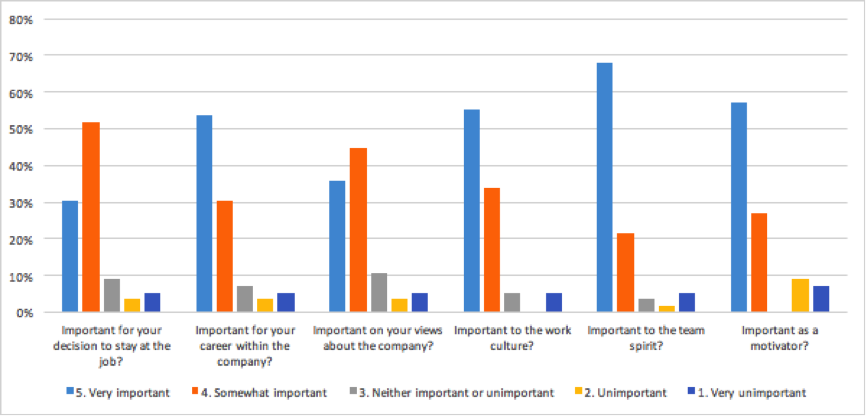This is how important the line manager is for millennials
Have you been following my posts about millennials? As I wrote my MBA master thesis about “What motivates early millennials in the workplace?” there has been a series of posts about the topic “Seven Areas of Work Motivation“, “The different types of millennials” and “This motivates millennials in the workplace”.
I asked 56 millennials from 22 countries and in-depth interviewed 14 participants from 9 countries.
This is what they said:
Have you ever left a job because of your line-manager?
(Yes 41%, No 59%)
How important has your line-manager(s) been in your career?
(Graphs shows only millennial results)
| Millennials | Generation X | ||
| Important for your decision to stay at the job? | 5. Very important | 30.4% | 60.9% |
| 4. Somewhat important | 51.8% | 30.4% | |
| 3. Neither important or unimportant | 8.9% | 8.7% | |
| 2. Unimportant | 3.6% | 0% | |
| 1. Very unimportant | 5.4% | 0% | |
|
|
|||
| Important for your career within the company? | 5. Very important | 53.6% | 65.2% |
| 4. Somewhat important | 30.4% | 34.8% | |
| 3. Neither important or unimportant | 7.1% | 0% | |
| 2. Unimportant | 3.6% | 0% | |
| 1. Very unimportant | 5.4% | 0% | |
|
|
|||
| Important on your views about the company? | 5. Very important | 35.7% | 34.8% |
| 4. Somewhat important | 44.6% | 39.1% | |
| 3. Neither important or unimportant | 10.7% | 21.7% | |
| 2. Unimportant | 3.6% | 4.3% | |
| 1. Very unimportant | 5.4% | 0% | |
|
|
|||
| Important to the work culture? | 5. Very important | 55.4% | 60.9% |
| 4. Somewhat important | 33.9% | 34.8% | |
| 3. Neither important or unimportant | 5.4% | 0% | |
| 2. Unimportant | 0% | 3.4% | |
| 1. Very unimportant | 5.4% | 0% | |
|
|
|||
| Important to the team spirit? | 5. Very important | 67.9% | 43.5% |
| 4. Somewhat important | 21.4% | 43.5% | |
| 3. Neither important or unimportant | 3.6% | 13% | |
| 2. Unimportant | 1.8% | 0% | |
| 1. Very unimportant | 5.4% | 0% | |
|
|
|||
| Important as a motivator? | 5. Very important | 57.1% | 17.4% |
| 4. Somewhat important | 26.8% | 73.9% | |
| 3. Neither important or unimportant | 0% | 8.7% | |
| 2. Unimportant | 8.9% | 0% | |
| 1. Very unimportant | 7.1% | 0% | |
Interpretation
The line manager role is seen as an important feedback giver. To give inspiration, clarify structure, give space or freedom, support, being the decision maker on their future, someone who defines the goals, gives permission, is a mentor, assigning tasks and a protector. There are many roles the line manager should fulfill and the person is important to the participants, however not all meet their line manager on a daily basis, and sometimes the line manager is perceived to not know the work of the participants.
Conclusion
The line manager is the single most important person for the employees as it’s their direct line of contact and at the same time the spokesperson for the company, so in that sense also the company face towards their employees. The importance should not be underestimated. Companies should go to great lengths in order to make sure that they have the correct managers hired. Managers that care about the development and well-being of their “subordinates” and has it highest on their agenda. “People Leave Managers, Not Companies” (Lipman, 2015). As the line manager has been identified as the main source for feedback, a way for millennials to understand if they meet the expectations, they are even more important. Feedback sails up as the single most important motivator for millennials particularly, but also for generation X. It’s important to have a manager in all sorts of organizations, not just functional ones. When working remotely, having matrix structures with multiple report lines or a flat structure with less hierarchy, there should be an appointed manager that gives feedback and most of all – cares.
Free text from participants (interesting read!):
What made you leave the job?
“In this stage of my career, I care more about people what they think about my CV. If I quiet in a short time span it can backfire to me in some way.”
“Denied development opportunities, no empowerment, couldn’t agree with the leadership style”
“The type of management (fear) didn’t match with my vision of collaborative management”
“The behavior of our line-manager was inhuman and unacceptable for our team. We decided to quit the job together.”
“I had a manager who was lacking leadership/management skills big time. I was very clear and upfront about what I wanted to achieve in my role, and I myself worked very hard to achieve them, but received no mentorship/leadership from my manager at the time. She also did not think it was important to maintain team spirit, get to know anything personal about her employers, which to me, are key elements to make sure that people have fun at workplace and enjoy working – you do not have to be best friends, but I think it a nice character that your manager knows something personal about you too.”
“Managed in a very authoritarian way, and provided no advancement opportunities, but this was in a very early job. In higher professional jobs it hasn’t been as much of an issue”
“Lacking development at workplace, not getting involved in decisions, poor future perspective, line-manager not promoting individuals, line-manager not wanting to change old processes”
“Not being open for change/improvement. To focused on the same old routine that didn’t make us grow.”
“Too much micromanagement.”
“Lack of communication and leadership skills on their part.”
“Management style (Goals, guidance) was no longer convenient”
“Line manager did not allow me to develop to reach my goals”
“My line manager was not supportive, encouraging, or someone whom I felt inspired me. I didn’t feel there was trust, and that to me is extremely important.”
“My line manager’s behavior and attitude to his team.”
“The line-manager didn’t value my effort and did not support my development.
It is demotivating to stay at the same job with the same responsibilities and
not getting new challenges nor develop further.”
“Can’t vote with negativity”
“Incapable manager”
“He was totally incompetent, bureaucratic, and sneaky”
“no possibility for enhancements, no more challenges”
“missing strategy alignment, missing leader attitude”
“The line manager was choleric and shouted at people. The second time the line manager wasn’t able to define goals and provide a strategic orientation for my department.”
“Not enough scope of action, felt bored in the job, overqualified and not valued”
“I accept correct behavior of a manager, treating people equally and fair. If this is not the case the person shouldn’t be a manager and there is no reason for me to stay in that job.”
References:
Lipman (2015), “People Leave Managers, Not Companies”, Publisher: Forbes
Available at: http://www.forbes.com/sites/victorlipman/2015/08/04/people-leave-managers-not-companies/#727b89fb16f3 Accessed on [March 25th 2016].
photo credit: CommScope CommScope Lifestyle Images 3 via photopin (license)


